Leadership & Management: Service Industry Analysis - Wa-Pila Hotels
VerifiedAdded on 2023/01/23
|9
|2277
|53
Report
AI Summary
This report examines leadership and management within the service industry, focusing on Wa-Pila Hotels. It covers classical management theories, leadership styles, and factors influencing service industry structures. The report assesses current hard and soft management skills, including team dynamics, conflict resolution, communication, and time management. Future management skills such as planning and innovative thinking are also discussed, alongside future leadership skills like creative thinking, technological understanding, and immersive learning. A comparison of change management systems between Wa-Pila Hotels and British Airways is presented, highlighting the impact of change on leadership styles. The report concludes that effective leadership and management are crucial for achieving organizational goals in the service sector.
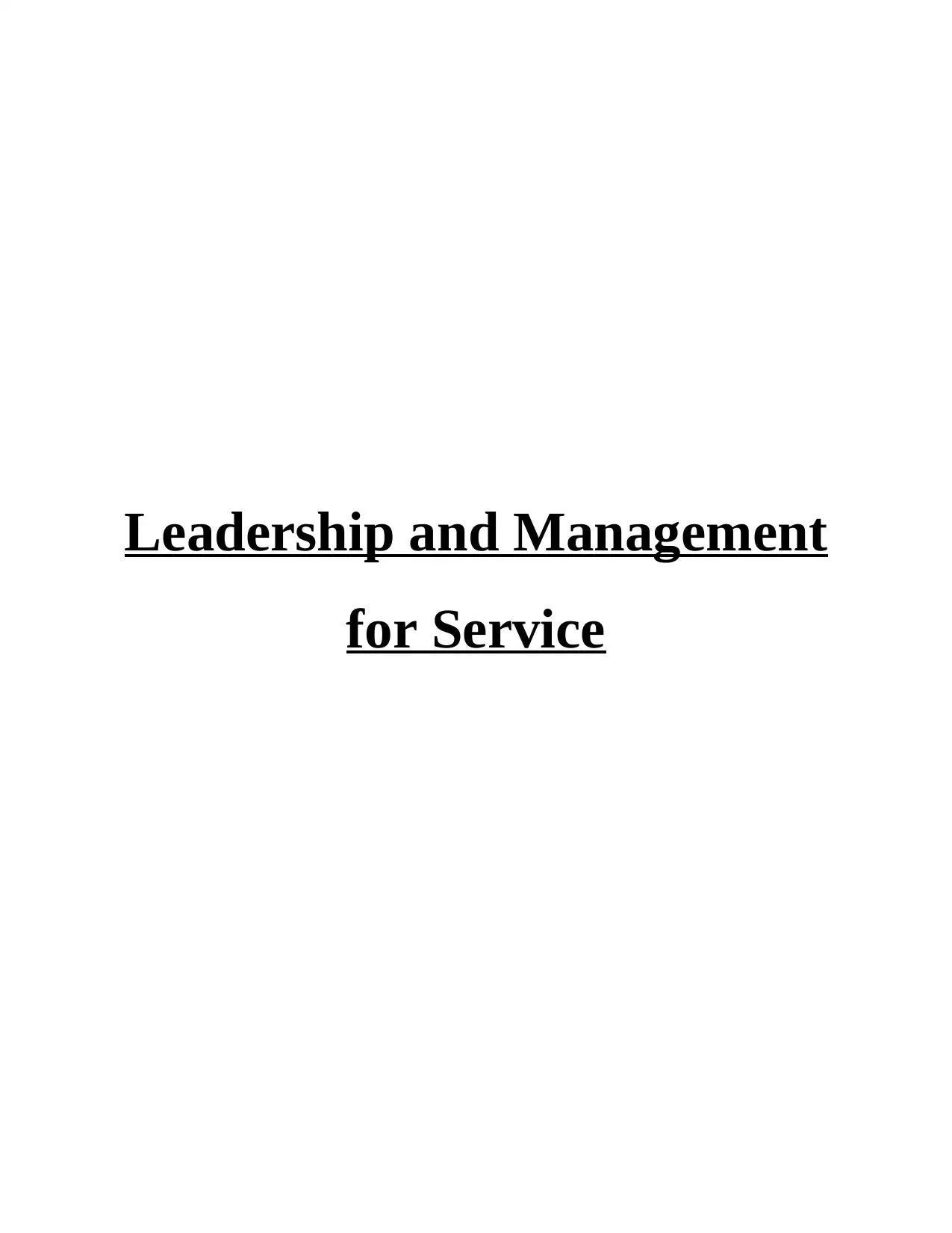
Leadership and Management
for Service
for Service
Paraphrase This Document
Need a fresh take? Get an instant paraphrase of this document with our AI Paraphraser
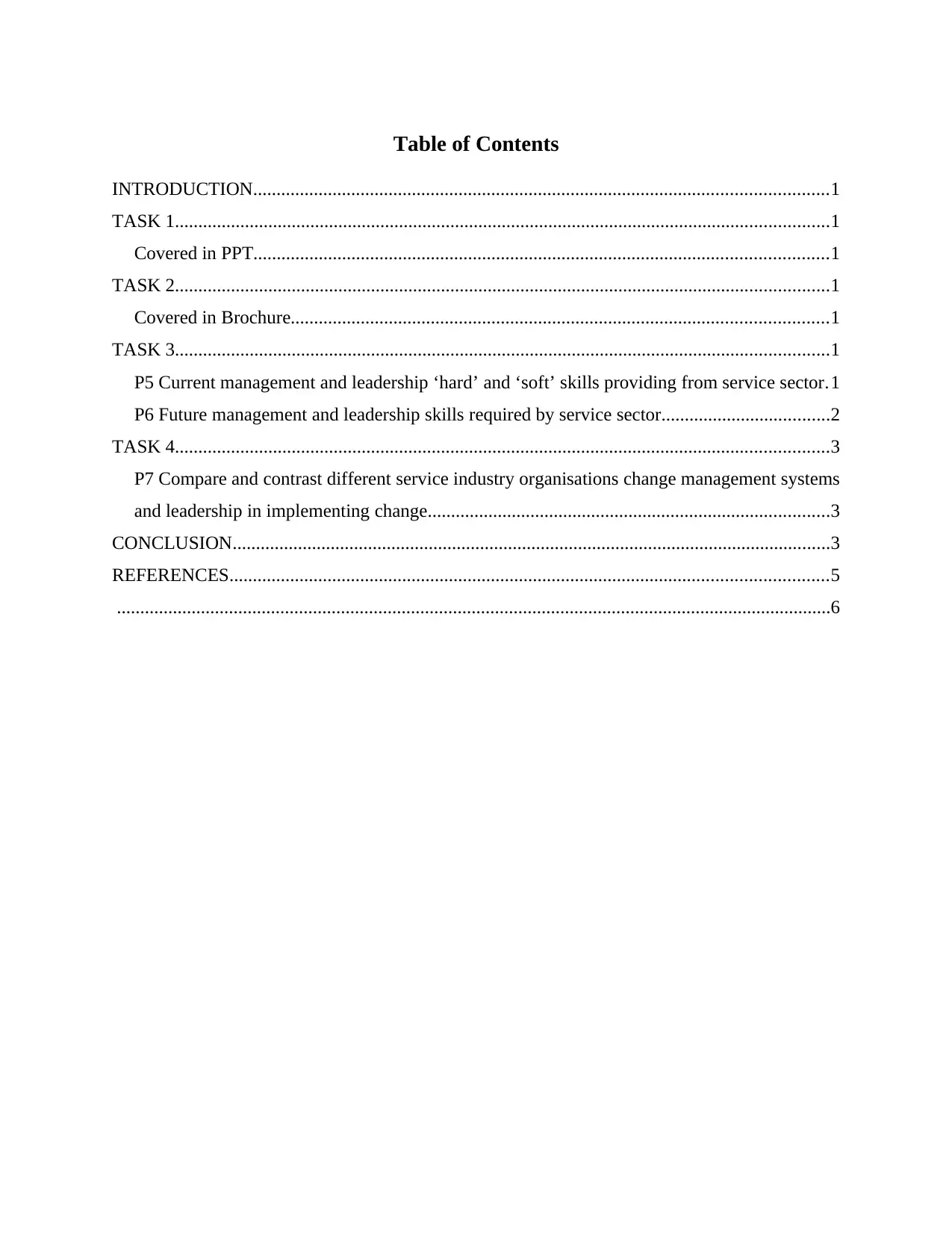
Table of Contents
INTRODUCTION...........................................................................................................................1
TASK 1............................................................................................................................................1
Covered in PPT...........................................................................................................................1
TASK 2............................................................................................................................................1
Covered in Brochure...................................................................................................................1
TASK 3............................................................................................................................................1
P5 Current management and leadership ‘hard’ and ‘soft’ skills providing from service sector.1
P6 Future management and leadership skills required by service sector....................................2
TASK 4............................................................................................................................................3
P7 Compare and contrast different service industry organisations change management systems
and leadership in implementing change......................................................................................3
CONCLUSION................................................................................................................................3
REFERENCES................................................................................................................................5
.........................................................................................................................................................6
INTRODUCTION...........................................................................................................................1
TASK 1............................................................................................................................................1
Covered in PPT...........................................................................................................................1
TASK 2............................................................................................................................................1
Covered in Brochure...................................................................................................................1
TASK 3............................................................................................................................................1
P5 Current management and leadership ‘hard’ and ‘soft’ skills providing from service sector.1
P6 Future management and leadership skills required by service sector....................................2
TASK 4............................................................................................................................................3
P7 Compare and contrast different service industry organisations change management systems
and leadership in implementing change......................................................................................3
CONCLUSION................................................................................................................................3
REFERENCES................................................................................................................................5
.........................................................................................................................................................6
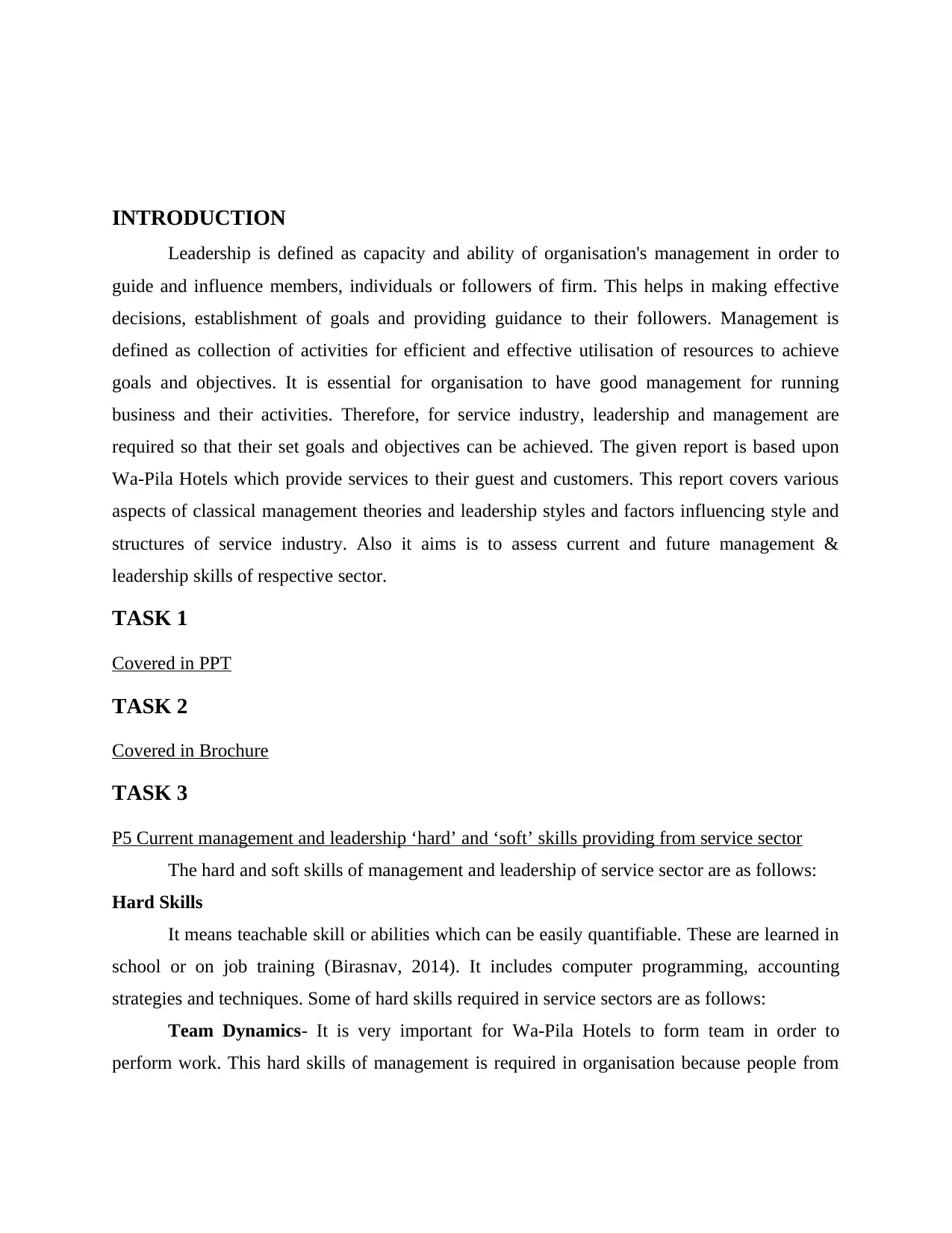
INTRODUCTION
Leadership is defined as capacity and ability of organisation's management in order to
guide and influence members, individuals or followers of firm. This helps in making effective
decisions, establishment of goals and providing guidance to their followers. Management is
defined as collection of activities for efficient and effective utilisation of resources to achieve
goals and objectives. It is essential for organisation to have good management for running
business and their activities. Therefore, for service industry, leadership and management are
required so that their set goals and objectives can be achieved. The given report is based upon
Wa-Pila Hotels which provide services to their guest and customers. This report covers various
aspects of classical management theories and leadership styles and factors influencing style and
structures of service industry. Also it aims is to assess current and future management &
leadership skills of respective sector.
TASK 1
Covered in PPT
TASK 2
Covered in Brochure
TASK 3
P5 Current management and leadership ‘hard’ and ‘soft’ skills providing from service sector
The hard and soft skills of management and leadership of service sector are as follows:
Hard Skills
It means teachable skill or abilities which can be easily quantifiable. These are learned in
school or on job training (Birasnav, 2014). It includes computer programming, accounting
strategies and techniques. Some of hard skills required in service sectors are as follows:
Team Dynamics- It is very important for Wa-Pila Hotels to form team in order to
perform work. This hard skills of management is required in organisation because people from
Leadership is defined as capacity and ability of organisation's management in order to
guide and influence members, individuals or followers of firm. This helps in making effective
decisions, establishment of goals and providing guidance to their followers. Management is
defined as collection of activities for efficient and effective utilisation of resources to achieve
goals and objectives. It is essential for organisation to have good management for running
business and their activities. Therefore, for service industry, leadership and management are
required so that their set goals and objectives can be achieved. The given report is based upon
Wa-Pila Hotels which provide services to their guest and customers. This report covers various
aspects of classical management theories and leadership styles and factors influencing style and
structures of service industry. Also it aims is to assess current and future management &
leadership skills of respective sector.
TASK 1
Covered in PPT
TASK 2
Covered in Brochure
TASK 3
P5 Current management and leadership ‘hard’ and ‘soft’ skills providing from service sector
The hard and soft skills of management and leadership of service sector are as follows:
Hard Skills
It means teachable skill or abilities which can be easily quantifiable. These are learned in
school or on job training (Birasnav, 2014). It includes computer programming, accounting
strategies and techniques. Some of hard skills required in service sectors are as follows:
Team Dynamics- It is very important for Wa-Pila Hotels to form team in order to
perform work. This hard skills of management is required in organisation because people from
⊘ This is a preview!⊘
Do you want full access?
Subscribe today to unlock all pages.

Trusted by 1+ million students worldwide
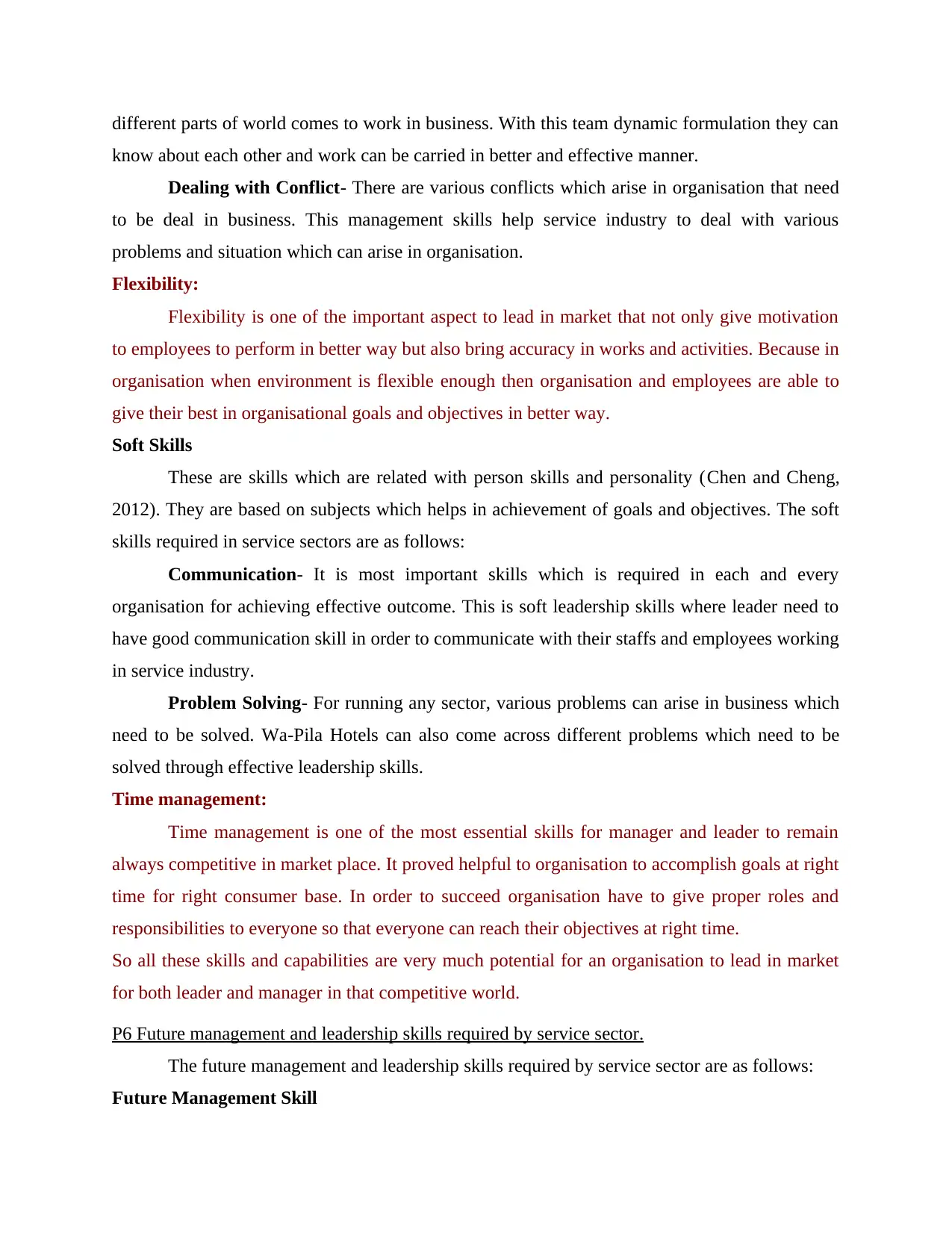
different parts of world comes to work in business. With this team dynamic formulation they can
know about each other and work can be carried in better and effective manner.
Dealing with Conflict- There are various conflicts which arise in organisation that need
to be deal in business. This management skills help service industry to deal with various
problems and situation which can arise in organisation.
Flexibility:
Flexibility is one of the important aspect to lead in market that not only give motivation
to employees to perform in better way but also bring accuracy in works and activities. Because in
organisation when environment is flexible enough then organisation and employees are able to
give their best in organisational goals and objectives in better way.
Soft Skills
These are skills which are related with person skills and personality (Chen and Cheng,
2012). They are based on subjects which helps in achievement of goals and objectives. The soft
skills required in service sectors are as follows:
Communication- It is most important skills which is required in each and every
organisation for achieving effective outcome. This is soft leadership skills where leader need to
have good communication skill in order to communicate with their staffs and employees working
in service industry.
Problem Solving- For running any sector, various problems can arise in business which
need to be solved. Wa-Pila Hotels can also come across different problems which need to be
solved through effective leadership skills.
Time management:
Time management is one of the most essential skills for manager and leader to remain
always competitive in market place. It proved helpful to organisation to accomplish goals at right
time for right consumer base. In order to succeed organisation have to give proper roles and
responsibilities to everyone so that everyone can reach their objectives at right time.
So all these skills and capabilities are very much potential for an organisation to lead in market
for both leader and manager in that competitive world.
P6 Future management and leadership skills required by service sector.
The future management and leadership skills required by service sector are as follows:
Future Management Skill
know about each other and work can be carried in better and effective manner.
Dealing with Conflict- There are various conflicts which arise in organisation that need
to be deal in business. This management skills help service industry to deal with various
problems and situation which can arise in organisation.
Flexibility:
Flexibility is one of the important aspect to lead in market that not only give motivation
to employees to perform in better way but also bring accuracy in works and activities. Because in
organisation when environment is flexible enough then organisation and employees are able to
give their best in organisational goals and objectives in better way.
Soft Skills
These are skills which are related with person skills and personality (Chen and Cheng,
2012). They are based on subjects which helps in achievement of goals and objectives. The soft
skills required in service sectors are as follows:
Communication- It is most important skills which is required in each and every
organisation for achieving effective outcome. This is soft leadership skills where leader need to
have good communication skill in order to communicate with their staffs and employees working
in service industry.
Problem Solving- For running any sector, various problems can arise in business which
need to be solved. Wa-Pila Hotels can also come across different problems which need to be
solved through effective leadership skills.
Time management:
Time management is one of the most essential skills for manager and leader to remain
always competitive in market place. It proved helpful to organisation to accomplish goals at right
time for right consumer base. In order to succeed organisation have to give proper roles and
responsibilities to everyone so that everyone can reach their objectives at right time.
So all these skills and capabilities are very much potential for an organisation to lead in market
for both leader and manager in that competitive world.
P6 Future management and leadership skills required by service sector.
The future management and leadership skills required by service sector are as follows:
Future Management Skill
Paraphrase This Document
Need a fresh take? Get an instant paraphrase of this document with our AI Paraphraser
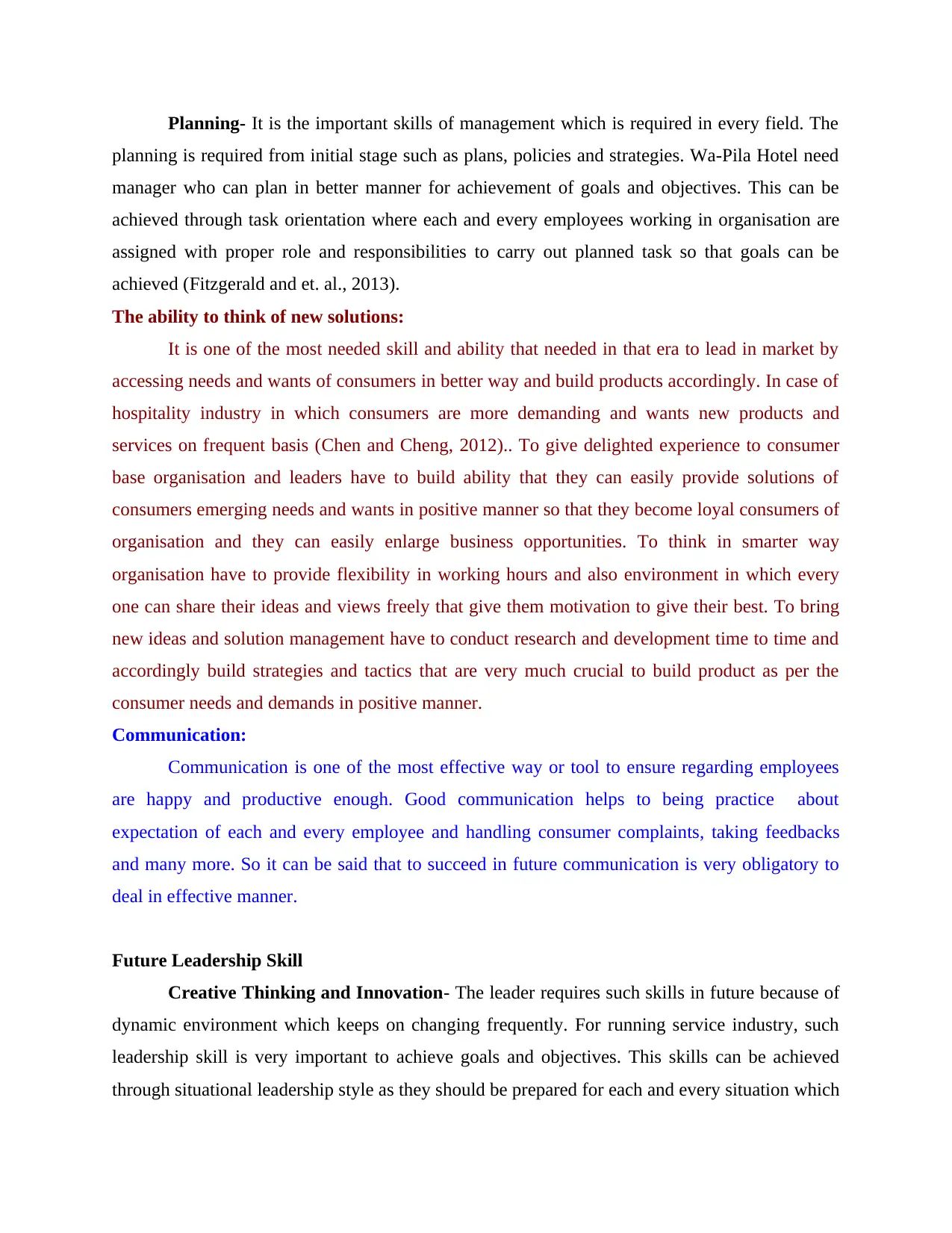
Planning- It is the important skills of management which is required in every field. The
planning is required from initial stage such as plans, policies and strategies. Wa-Pila Hotel need
manager who can plan in better manner for achievement of goals and objectives. This can be
achieved through task orientation where each and every employees working in organisation are
assigned with proper role and responsibilities to carry out planned task so that goals can be
achieved (Fitzgerald and et. al., 2013).
The ability to think of new solutions:
It is one of the most needed skill and ability that needed in that era to lead in market by
accessing needs and wants of consumers in better way and build products accordingly. In case of
hospitality industry in which consumers are more demanding and wants new products and
services on frequent basis (Chen and Cheng, 2012).. To give delighted experience to consumer
base organisation and leaders have to build ability that they can easily provide solutions of
consumers emerging needs and wants in positive manner so that they become loyal consumers of
organisation and they can easily enlarge business opportunities. To think in smarter way
organisation have to provide flexibility in working hours and also environment in which every
one can share their ideas and views freely that give them motivation to give their best. To bring
new ideas and solution management have to conduct research and development time to time and
accordingly build strategies and tactics that are very much crucial to build product as per the
consumer needs and demands in positive manner.
Communication:
Communication is one of the most effective way or tool to ensure regarding employees
are happy and productive enough. Good communication helps to being practice about
expectation of each and every employee and handling consumer complaints, taking feedbacks
and many more. So it can be said that to succeed in future communication is very obligatory to
deal in effective manner.
Future Leadership Skill
Creative Thinking and Innovation- The leader requires such skills in future because of
dynamic environment which keeps on changing frequently. For running service industry, such
leadership skill is very important to achieve goals and objectives. This skills can be achieved
through situational leadership style as they should be prepared for each and every situation which
planning is required from initial stage such as plans, policies and strategies. Wa-Pila Hotel need
manager who can plan in better manner for achievement of goals and objectives. This can be
achieved through task orientation where each and every employees working in organisation are
assigned with proper role and responsibilities to carry out planned task so that goals can be
achieved (Fitzgerald and et. al., 2013).
The ability to think of new solutions:
It is one of the most needed skill and ability that needed in that era to lead in market by
accessing needs and wants of consumers in better way and build products accordingly. In case of
hospitality industry in which consumers are more demanding and wants new products and
services on frequent basis (Chen and Cheng, 2012).. To give delighted experience to consumer
base organisation and leaders have to build ability that they can easily provide solutions of
consumers emerging needs and wants in positive manner so that they become loyal consumers of
organisation and they can easily enlarge business opportunities. To think in smarter way
organisation have to provide flexibility in working hours and also environment in which every
one can share their ideas and views freely that give them motivation to give their best. To bring
new ideas and solution management have to conduct research and development time to time and
accordingly build strategies and tactics that are very much crucial to build product as per the
consumer needs and demands in positive manner.
Communication:
Communication is one of the most effective way or tool to ensure regarding employees
are happy and productive enough. Good communication helps to being practice about
expectation of each and every employee and handling consumer complaints, taking feedbacks
and many more. So it can be said that to succeed in future communication is very obligatory to
deal in effective manner.
Future Leadership Skill
Creative Thinking and Innovation- The leader requires such skills in future because of
dynamic environment which keeps on changing frequently. For running service industry, such
leadership skill is very important to achieve goals and objectives. This skills can be achieved
through situational leadership style as they should be prepared for each and every situation which
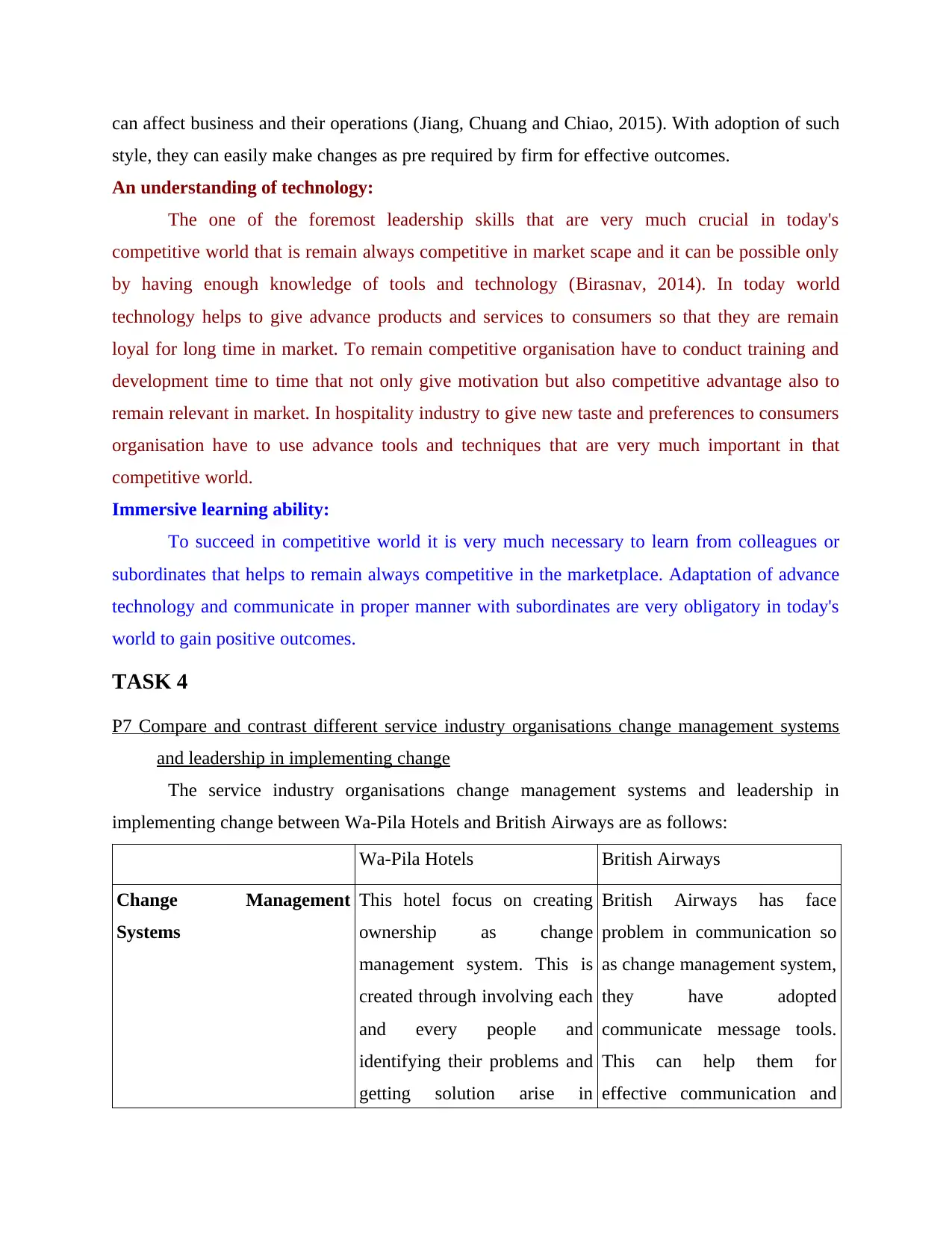
can affect business and their operations (Jiang, Chuang and Chiao, 2015). With adoption of such
style, they can easily make changes as pre required by firm for effective outcomes.
An understanding of technology:
The one of the foremost leadership skills that are very much crucial in today's
competitive world that is remain always competitive in market scape and it can be possible only
by having enough knowledge of tools and technology (Birasnav, 2014). In today world
technology helps to give advance products and services to consumers so that they are remain
loyal for long time in market. To remain competitive organisation have to conduct training and
development time to time that not only give motivation but also competitive advantage also to
remain relevant in market. In hospitality industry to give new taste and preferences to consumers
organisation have to use advance tools and techniques that are very much important in that
competitive world.
Immersive learning ability:
To succeed in competitive world it is very much necessary to learn from colleagues or
subordinates that helps to remain always competitive in the marketplace. Adaptation of advance
technology and communicate in proper manner with subordinates are very obligatory in today's
world to gain positive outcomes.
TASK 4
P7 Compare and contrast different service industry organisations change management systems
and leadership in implementing change
The service industry organisations change management systems and leadership in
implementing change between Wa-Pila Hotels and British Airways are as follows:
Wa-Pila Hotels British Airways
Change Management
Systems
This hotel focus on creating
ownership as change
management system. This is
created through involving each
and every people and
identifying their problems and
getting solution arise in
British Airways has face
problem in communication so
as change management system,
they have adopted
communicate message tools.
This can help them for
effective communication and
style, they can easily make changes as pre required by firm for effective outcomes.
An understanding of technology:
The one of the foremost leadership skills that are very much crucial in today's
competitive world that is remain always competitive in market scape and it can be possible only
by having enough knowledge of tools and technology (Birasnav, 2014). In today world
technology helps to give advance products and services to consumers so that they are remain
loyal for long time in market. To remain competitive organisation have to conduct training and
development time to time that not only give motivation but also competitive advantage also to
remain relevant in market. In hospitality industry to give new taste and preferences to consumers
organisation have to use advance tools and techniques that are very much important in that
competitive world.
Immersive learning ability:
To succeed in competitive world it is very much necessary to learn from colleagues or
subordinates that helps to remain always competitive in the marketplace. Adaptation of advance
technology and communicate in proper manner with subordinates are very obligatory in today's
world to gain positive outcomes.
TASK 4
P7 Compare and contrast different service industry organisations change management systems
and leadership in implementing change
The service industry organisations change management systems and leadership in
implementing change between Wa-Pila Hotels and British Airways are as follows:
Wa-Pila Hotels British Airways
Change Management
Systems
This hotel focus on creating
ownership as change
management system. This is
created through involving each
and every people and
identifying their problems and
getting solution arise in
British Airways has face
problem in communication so
as change management system,
they have adopted
communicate message tools.
This can help them for
effective communication and
⊘ This is a preview!⊘
Do you want full access?
Subscribe today to unlock all pages.

Trusted by 1+ million students worldwide
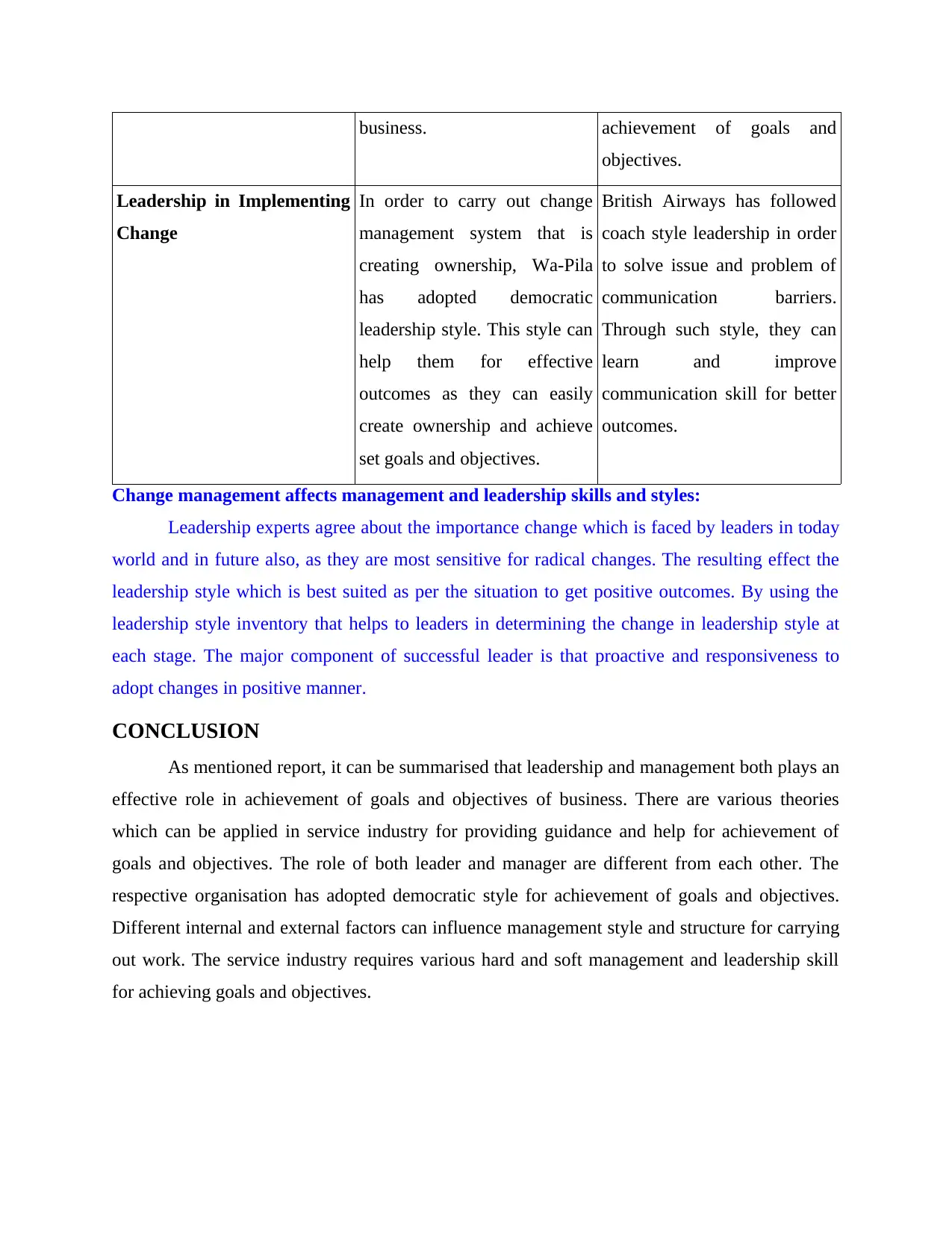
business. achievement of goals and
objectives.
Leadership in Implementing
Change
In order to carry out change
management system that is
creating ownership, Wa-Pila
has adopted democratic
leadership style. This style can
help them for effective
outcomes as they can easily
create ownership and achieve
set goals and objectives.
British Airways has followed
coach style leadership in order
to solve issue and problem of
communication barriers.
Through such style, they can
learn and improve
communication skill for better
outcomes.
Change management affects management and leadership skills and styles:
Leadership experts agree about the importance change which is faced by leaders in today
world and in future also, as they are most sensitive for radical changes. The resulting effect the
leadership style which is best suited as per the situation to get positive outcomes. By using the
leadership style inventory that helps to leaders in determining the change in leadership style at
each stage. The major component of successful leader is that proactive and responsiveness to
adopt changes in positive manner.
CONCLUSION
As mentioned report, it can be summarised that leadership and management both plays an
effective role in achievement of goals and objectives of business. There are various theories
which can be applied in service industry for providing guidance and help for achievement of
goals and objectives. The role of both leader and manager are different from each other. The
respective organisation has adopted democratic style for achievement of goals and objectives.
Different internal and external factors can influence management style and structure for carrying
out work. The service industry requires various hard and soft management and leadership skill
for achieving goals and objectives.
objectives.
Leadership in Implementing
Change
In order to carry out change
management system that is
creating ownership, Wa-Pila
has adopted democratic
leadership style. This style can
help them for effective
outcomes as they can easily
create ownership and achieve
set goals and objectives.
British Airways has followed
coach style leadership in order
to solve issue and problem of
communication barriers.
Through such style, they can
learn and improve
communication skill for better
outcomes.
Change management affects management and leadership skills and styles:
Leadership experts agree about the importance change which is faced by leaders in today
world and in future also, as they are most sensitive for radical changes. The resulting effect the
leadership style which is best suited as per the situation to get positive outcomes. By using the
leadership style inventory that helps to leaders in determining the change in leadership style at
each stage. The major component of successful leader is that proactive and responsiveness to
adopt changes in positive manner.
CONCLUSION
As mentioned report, it can be summarised that leadership and management both plays an
effective role in achievement of goals and objectives of business. There are various theories
which can be applied in service industry for providing guidance and help for achievement of
goals and objectives. The role of both leader and manager are different from each other. The
respective organisation has adopted democratic style for achievement of goals and objectives.
Different internal and external factors can influence management style and structure for carrying
out work. The service industry requires various hard and soft management and leadership skill
for achieving goals and objectives.
Paraphrase This Document
Need a fresh take? Get an instant paraphrase of this document with our AI Paraphraser
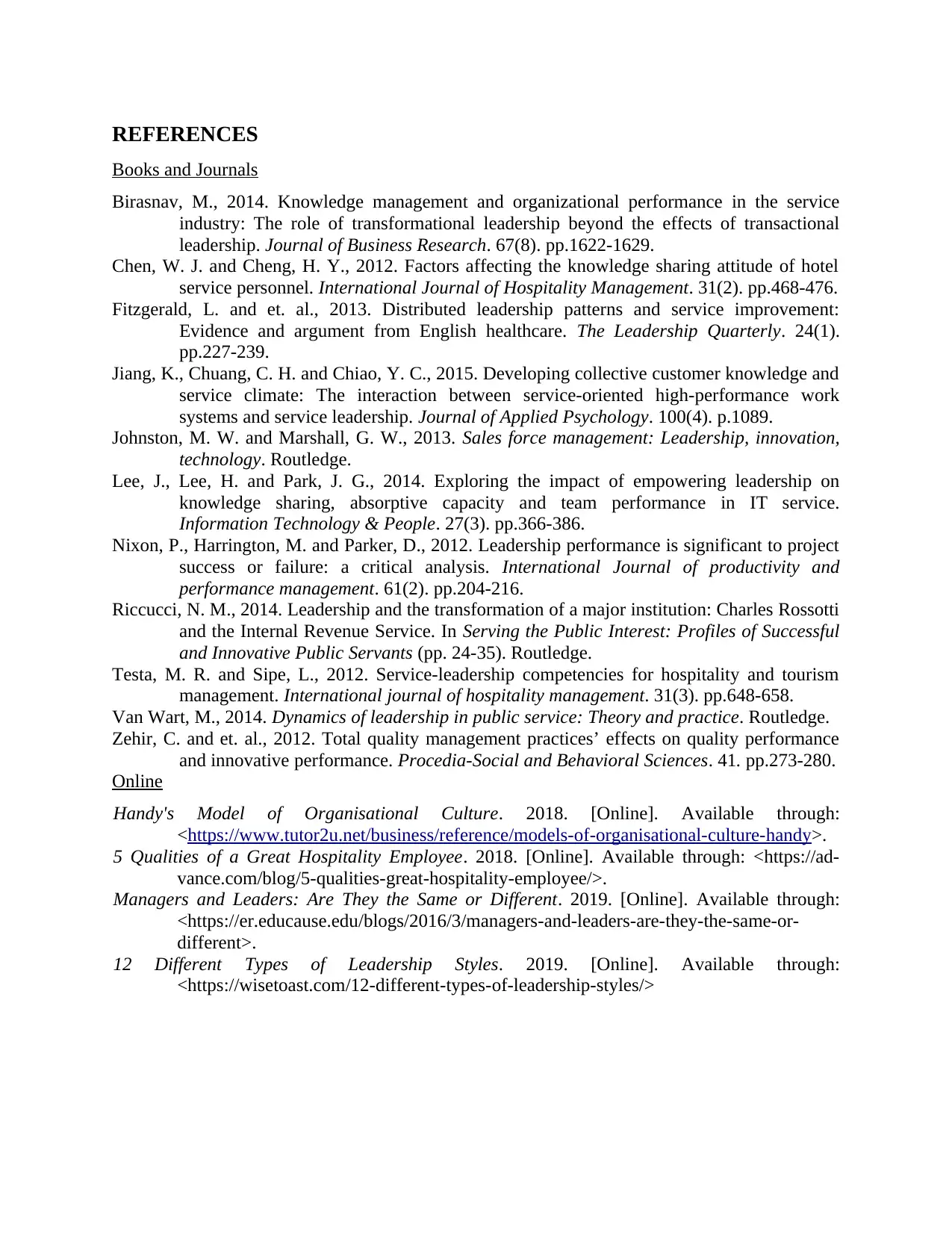
REFERENCES
Books and Journals
Birasnav, M., 2014. Knowledge management and organizational performance in the service
industry: The role of transformational leadership beyond the effects of transactional
leadership. Journal of Business Research. 67(8). pp.1622-1629.
Chen, W. J. and Cheng, H. Y., 2012. Factors affecting the knowledge sharing attitude of hotel
service personnel. International Journal of Hospitality Management. 31(2). pp.468-476.
Fitzgerald, L. and et. al., 2013. Distributed leadership patterns and service improvement:
Evidence and argument from English healthcare. The Leadership Quarterly. 24(1).
pp.227-239.
Jiang, K., Chuang, C. H. and Chiao, Y. C., 2015. Developing collective customer knowledge and
service climate: The interaction between service-oriented high-performance work
systems and service leadership. Journal of Applied Psychology. 100(4). p.1089.
Johnston, M. W. and Marshall, G. W., 2013. Sales force management: Leadership, innovation,
technology. Routledge.
Lee, J., Lee, H. and Park, J. G., 2014. Exploring the impact of empowering leadership on
knowledge sharing, absorptive capacity and team performance in IT service.
Information Technology & People. 27(3). pp.366-386.
Nixon, P., Harrington, M. and Parker, D., 2012. Leadership performance is significant to project
success or failure: a critical analysis. International Journal of productivity and
performance management. 61(2). pp.204-216.
Riccucci, N. M., 2014. Leadership and the transformation of a major institution: Charles Rossotti
and the Internal Revenue Service. In Serving the Public Interest: Profiles of Successful
and Innovative Public Servants (pp. 24-35). Routledge.
Testa, M. R. and Sipe, L., 2012. Service-leadership competencies for hospitality and tourism
management. International journal of hospitality management. 31(3). pp.648-658.
Van Wart, M., 2014. Dynamics of leadership in public service: Theory and practice. Routledge.
Zehir, C. and et. al., 2012. Total quality management practices’ effects on quality performance
and innovative performance. Procedia-Social and Behavioral Sciences. 41. pp.273-280.
Online
Handy's Model of Organisational Culture. 2018. [Online]. Available through:
<https://www.tutor2u.net/business/reference/models-of-organisational-culture-handy>.
5 Qualities of a Great Hospitality Employee. 2018. [Online]. Available through: <https://ad-
vance.com/blog/5-qualities-great-hospitality-employee/>.
Managers and Leaders: Are They the Same or Different. 2019. [Online]. Available through:
<https://er.educause.edu/blogs/2016/3/managers-and-leaders-are-they-the-same-or-
different>.
12 Different Types of Leadership Styles. 2019. [Online]. Available through:
<https://wisetoast.com/12-different-types-of-leadership-styles/>
Books and Journals
Birasnav, M., 2014. Knowledge management and organizational performance in the service
industry: The role of transformational leadership beyond the effects of transactional
leadership. Journal of Business Research. 67(8). pp.1622-1629.
Chen, W. J. and Cheng, H. Y., 2012. Factors affecting the knowledge sharing attitude of hotel
service personnel. International Journal of Hospitality Management. 31(2). pp.468-476.
Fitzgerald, L. and et. al., 2013. Distributed leadership patterns and service improvement:
Evidence and argument from English healthcare. The Leadership Quarterly. 24(1).
pp.227-239.
Jiang, K., Chuang, C. H. and Chiao, Y. C., 2015. Developing collective customer knowledge and
service climate: The interaction between service-oriented high-performance work
systems and service leadership. Journal of Applied Psychology. 100(4). p.1089.
Johnston, M. W. and Marshall, G. W., 2013. Sales force management: Leadership, innovation,
technology. Routledge.
Lee, J., Lee, H. and Park, J. G., 2014. Exploring the impact of empowering leadership on
knowledge sharing, absorptive capacity and team performance in IT service.
Information Technology & People. 27(3). pp.366-386.
Nixon, P., Harrington, M. and Parker, D., 2012. Leadership performance is significant to project
success or failure: a critical analysis. International Journal of productivity and
performance management. 61(2). pp.204-216.
Riccucci, N. M., 2014. Leadership and the transformation of a major institution: Charles Rossotti
and the Internal Revenue Service. In Serving the Public Interest: Profiles of Successful
and Innovative Public Servants (pp. 24-35). Routledge.
Testa, M. R. and Sipe, L., 2012. Service-leadership competencies for hospitality and tourism
management. International journal of hospitality management. 31(3). pp.648-658.
Van Wart, M., 2014. Dynamics of leadership in public service: Theory and practice. Routledge.
Zehir, C. and et. al., 2012. Total quality management practices’ effects on quality performance
and innovative performance. Procedia-Social and Behavioral Sciences. 41. pp.273-280.
Online
Handy's Model of Organisational Culture. 2018. [Online]. Available through:
<https://www.tutor2u.net/business/reference/models-of-organisational-culture-handy>.
5 Qualities of a Great Hospitality Employee. 2018. [Online]. Available through: <https://ad-
vance.com/blog/5-qualities-great-hospitality-employee/>.
Managers and Leaders: Are They the Same or Different. 2019. [Online]. Available through:
<https://er.educause.edu/blogs/2016/3/managers-and-leaders-are-they-the-same-or-
different>.
12 Different Types of Leadership Styles. 2019. [Online]. Available through:
<https://wisetoast.com/12-different-types-of-leadership-styles/>

⊘ This is a preview!⊘
Do you want full access?
Subscribe today to unlock all pages.

Trusted by 1+ million students worldwide
1 out of 9
Related Documents
Your All-in-One AI-Powered Toolkit for Academic Success.
+13062052269
info@desklib.com
Available 24*7 on WhatsApp / Email
![[object Object]](/_next/static/media/star-bottom.7253800d.svg)
Unlock your academic potential
Copyright © 2020–2026 A2Z Services. All Rights Reserved. Developed and managed by ZUCOL.





